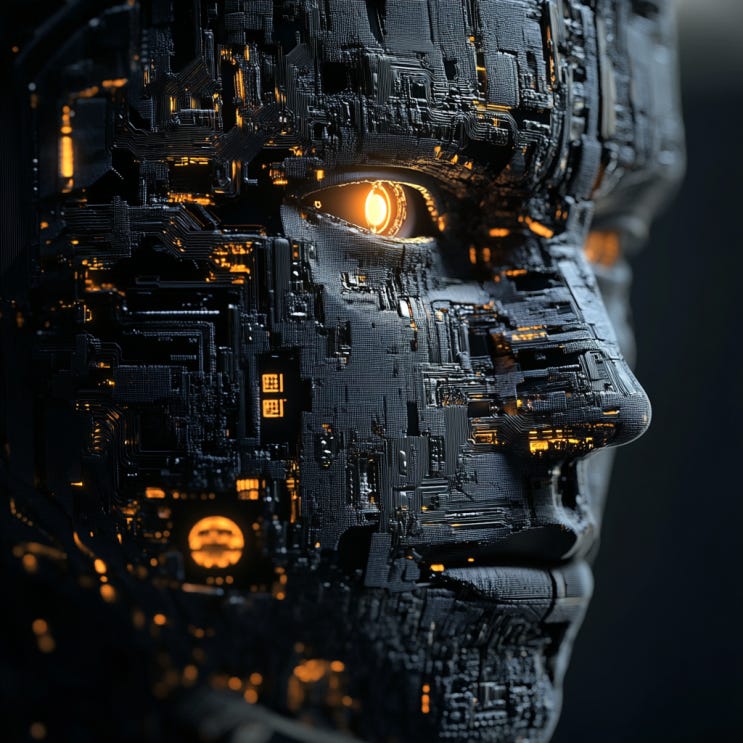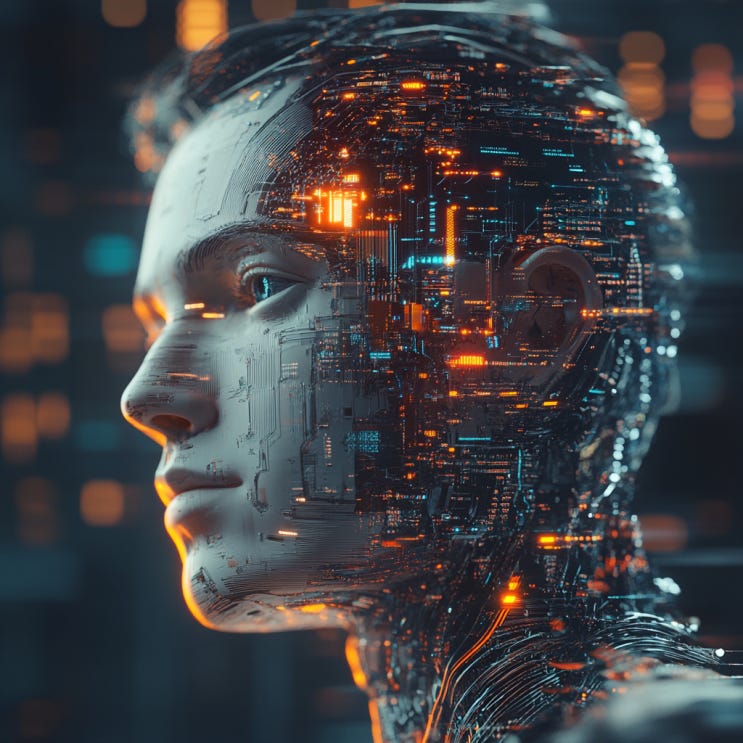Top 30 Software Companies by Highest AI Agent ROI (%) Projections
I estimate the top 30 software companies most likely to benefit in ROI from AI agents
AI agents are poised to potentially revolutionize revenue generation for software companies, but impact will vary significantly by biz model.
Which are most likely to see the biggest ROI (%) gains from AI agents?
I've identified 30 software companies that I believe have the potential to achieve substantial returns within 5 years of full-scale AI agent deployment.
This is speculative, of course, but based on analysis of their current business models and strategic positioning.
To frame this discussion, it’s essential to understand where AI agents fit into OpenAI’s 5-stage roadmap to Artificial General Intelligence (AGI):
Chatbots: AI with conversational language
Reasoners: Human-level problem solving
AI Agents: AI systems that can take actions
Innovators: AI that can aid in invention
Organizations: AI that can do the work of an entire company
Currently we’re at Stage 2 on the roadmap but some think Stage 3 is just around the corner… others argue that mega cap software companies are already deploying basic agents and/or beta-testing more advanced AI agents for future deployment.
Regardless of where we are right now on the roadmap – the most logical progression is as follows:
Humans: Only humans taking action and problem solving.
Humans + AI: AI tools augment human capabilities.
AI agents with human oversight: AI agents handling a majority of the software engineering with human in-the-loop oversight.
Fleets of AI agents as software engineers: AI agents optimized and refined to execute workflows independently – requiring minimal or zero human intervention. (May still be unable to replace elite-level engineers.)
All software engineers are agents and/or emulations of elite human engineers (optimized to handle any situation): AI agents evolve into seamless replicas of human workflows (e.g. handling coding, debugging, testing, and deployment at scale) with zero oversight. Perhaps only other AI agents are required to be in-the-loop for oversight to ensure no irregularities.
What are AI agents?
AI agents are advanced autonomous systems designed to perceive their environment, make decisions, and take actions to achieve specific goals.
They adapt, learn, and operate independently to handle complex tasks, often resembling virtual workers.
Unlike simple bots, AI agents are proactive, capable of managing workflows, predicting challenges, and optimizing outcomes without constant human intervention.
AI Agents vs. Chatbots: Key Differences
While both utilize AI tech, they differ significantly in capabilities and autonomy.
Autonomy: Chatbots are primarily reactive, responding to user inputs based on predefined rules or scripts. AI agents are proactive and autonomous, capable of operating independently, making decisions, and taking actions without constant human intervention.
Complexity: Chatbots handle simple, structured interactions, such as answering FAQs. AI agents manage complex, dynamic tasks, requiring contextual understanding and sophisticated decision-making.
Adaptability: Chatbots are generally static, requiring manual updates. AI agents learn and adapt over time, using machine learning to improve their performance and handle new situations.
Proactivity: Chatbots wait for user prompts. AI agents can anticipate needs, initiate actions, and adapt to changing environments.
AI Agents: A High-Growth Investment Opportunity
The market for AI agents is experiencing rapid expansion, presenting a compelling investment opportunity.
This growth is fueled by increasing demand for automation, enhanced productivity, improved customer experiences, and the ability to leverage data for better decision-making.
Market Size & Growth Projections
Current Market Size (2024): The market for AI agents is estimated to be valued at ~$5.1 billion in 2024, indicating a strong foundation for future growth.
Projected Growth: The market is poised for substantial expansion in the coming years. I’ve seen a variety of growth projections, but most are explosive. Some sources suggest $47.1B (2030) and > $100B (2032).
CAGR (Compound Annual Growth Rate): Achieving this projected growth translates to a remarkable CAGR of approximately 38% between 2024 and 2030.
How can AI agents benefit software companies in the future?
There are many ways that AI agents will benefit elite software companies.
Currently in November 2024, jobs aren’t being replaced by AI agents… AI agents are still fairly nascent and undergoing extensive research, development, and testing.
That said, it’s a matter of time before AI agents are fully unleashed to drive massive: productivity gains, cost-cutting via employee terminations, and resource optimizations.
Agents will be optimized to complete specific tasks while collaborating with other agents (similar to the way human software engineers collaborate).
They’ll work 24/7 x 365 simulating entire workflows and replacing some humans, then most humans, then probably all human software engineers (if desired by the company).
We’ll likely start out with: (1) basic agents: can do some general stuff like entry-level; (2) mid-tier: can replace mid-level engineers; (3) elite-tier: can replace senior-level engineers, etc.
Productivity Gains: AI agents automate repetitive tasks, streamline workflows, and work continuously, leading to significant increases in developer output and faster development cycles. This translates to more features shipped faster and quicker responses to market demands. Example: An AI agent can automate code reviews, freeing up developers to focus on more complex tasks.
Cost Reduction (Downsizing & Resource Optimization): AI agents reduce labor costs by automating roles and optimizing resource utilization (compute power, infrastructure, cloud services). This improves operational efficiency and frees up budget for strategic initiatives. Example: AI agents can dynamically allocate cloud resources, minimizing wasted spending and optimizing performance.
Security & Risk Management: AI agents bolster cybersecurity by detecting and responding to threats in real time, proactively identifying vulnerabilities, and ensuring compliance with evolving regulations. This minimizes the risk and cost of security breaches. Example: AI agents can monitor network traffic for anomalous patterns, alerting security teams to potential threats before they escalate.
Developer Experience Optimization: AI-powered tools empower developers with intelligent code completion, automated testing, streamlined debugging, and personalized learning resources. This enhances developer productivity, job satisfaction, and code quality, leading to better software and faster release cycles. Example: AI-powered code completion tools can suggest code snippets and identify potential bugs in real time, reducing development time and improving code quality.
Accelerated Innovation (New Software & Optimizations): AI agents accelerate the pace of innovation by optimizing existing systems, automating the development of new features, and exploring novel software architectures and algorithms. This allows companies to bring new products and services to market faster. Example: AI agents can automatically generate code for basic features, allowing developers to focus on more complex and innovative aspects of the project.
Advanced Data Analysis & Business Intelligence: AI agents enhance data analysis by processing massive datasets in real-time, identifying patterns and anomalies, generating predictive models, and providing actionable insights for data-driven decision-making. Example: AI agents can analyze user behavior data to identify trends and predict future demand, informing product development and marketing strategies.
Future-Proofing (Technical Debt Reduction & Emerging Tech Integration): AI agents help companies stay ahead of the curve by automating the modernization of legacy systems, reducing technical debt, evaluating and integrating emerging technologies, and continuously refining system architecture for scalability. Example: AI agents can analyze codebases to identify and prioritize areas for refactoring, reducing technical debt and improving maintainability.
Enhanced Quality Assurance: AI transforms quality assurance by automating testing processes, generating test cases, predicting potential bugs, and enabling self-healing software. This leads to higher quality software with fewer defects and faster release cycles. Example: AI agents can generate test cases based on code changes and user behavior patterns, ensuring comprehensive test coverage.
Automated Marketing & Sales: AI agents personalize marketing campaigns, automate lead generation and qualification, optimize pricing strategies, and analyze customer behavior to improve conversion rates and drive sales growth. Example: AI agents can personalize email marketing campaigns based on customer demographics and past interactions, increasing engagement and conversion rates.
Improved Customer Success (Context-Specific): AI agents enhance customer experiences by providing personalized support, proactively identifying and resolving issues, automating onboarding processes, and analyzing customer feedback to improve satisfaction and reduce churn. Example: AI-powered chatbots can provide instant support to customers, answering common questions and resolving simple issues without human intervention.
Top 30 Software Companies for AI Agent-Driven ROI (%)
I created a subjectively ranked list of what I consider to the top software companies for ROI potential (%) post-implementation of AI agents (5Y) – and optimized it with feedback from multiple AIs.
Why? For investors to consider. If you think AI agents will eventually become a big part of the future – it’s worth contemplating the degree to which these agents will likely impact valuations of software companies.
This list is mostly speculative and considers things like market position & resources to develop/implement agents, business model, existing AI integration, potential for AI agent-driven optimizations, etc.
The software landscape is dynamic, and actual results may vary significantly – this is just food for thought.
Tier 1: Elite Impact (250-400% ROI Potential)
Keep reading with a 7-day free trial
Subscribe to ASAP Drew to keep reading this post and get 7 days of free access to the full post archives.



